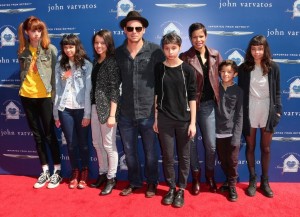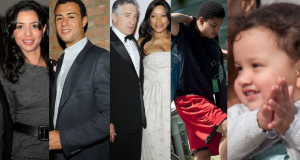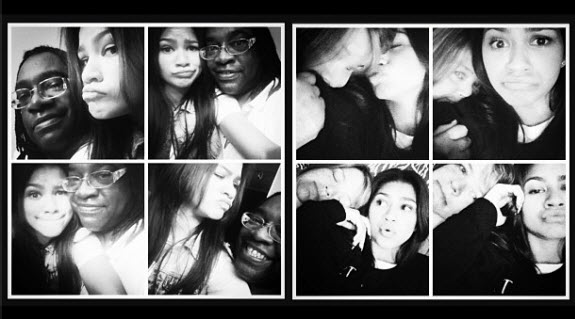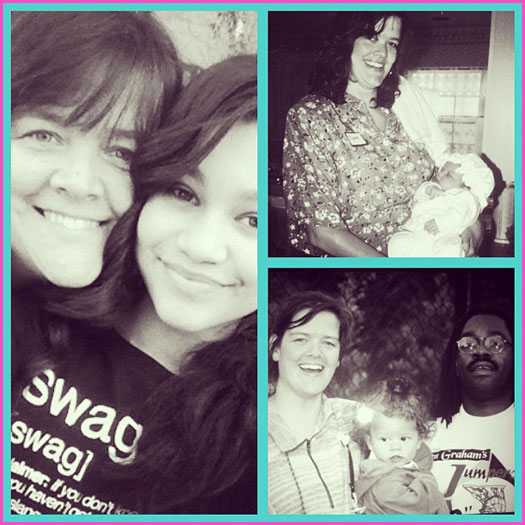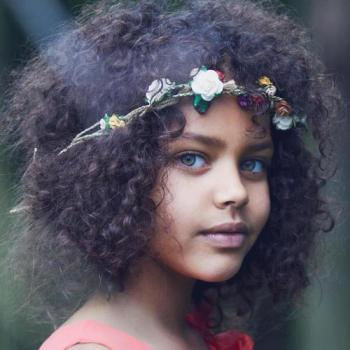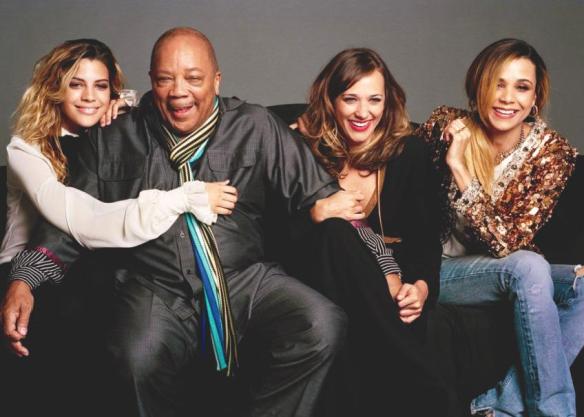RASHIDA: I wouldn’t trade my family for anything. My mother shocked her Jewish parents by marrying out of her religion and race. And my father: growing up poor and black, buckling the odds and becoming so successful, having the attitude of “I love this woman! We’re going to have babies and to hell with anyone who doesn’t like it!”
KIDADA: We had a sweet, encapsulated family. We were our own little world. But there’s the warmth of love inside a family, and then there’s the outside world. When I was born in 1974, there were almost no other biracial families–or black families–in our neighborhood. I was brown-skinned with short, curly hair. Mommy would take me out in my stroller and people would say, “What a beautiful baby…whose is it?” Rashida came along in 1976. She had straight hair and lighter skin. My eyes were brown; hers were green. IN preschool, our mother enrolled us in the Buckley School, an exclusive private school. It was almost all white.
RASHIDA: In reaction to all that differentess, Kidada tried hard to define herself as a unique person by becoming a real tomboy.
KIDADA: While Rashida wore girly dresses, I loved my Mr. T dolls and my Jaws T-shirt. But seeing the straight hair like the other girls had, like my sister had…I felt: “It’s not fair! I want that hair!”
PEGGY: I was the besotted mother of two beautiful daughters I’d had with the man I loved–I saw Kidada through those eyes. I thought she had the most gorgeous hair–those curly, curly ringlets. I still think so!
KIDADA: One day a little blond classmate just out and called me “Chocolate bar.” I shot back: “Vanilla!”
QUINCY: I felt deeply for Kidada; I thought racism would be over by the eighties. My role was to put things in perspective for her, project optimism, imply that things were better than they’d been for me growing up on the south side of Chicago in the 1930s.
KIDADA: I had another hurdle as a kid: I was dyslexic. I was held back in second grade. I flunked algebra three times. The hair, the skin, the frustration with schoolwork: It was all part of the shake. I was a strong-willed, quirky child–mischievous.
RASHIDA: Kidada was cool. I was a dork. I had a serious case of worship for my big sister. She was so strong, so popular, so rebellious. Here’s the difference in our charisma: When I was 8 and Kidada was 10, we tried to get invited into the audience of our favorite TV shows. Mine was Not Necessarily the News, a mock news show, and hers was Punky Brewster, about a spunky orphan. I went by the book, writing a fan letter–and I got back a form letter. Kidada called the show, used her charm, wouldn’t take no for an answer. Within a week she was invited to the set!
KIDADA: I was kicked out of Buckley in second grade for behavior problems. I didn’t want my mother to come to my new school. If kids saw her, it would be: “your mom’s white!” I told Mom she couldn’t pick me up; she had to wait down the street in her car. Did Rashida have that problem? No! She passed for white.
RASHIDA: “Passed”?! I had no control over how I looked. This is my natural hair, these are my natural eyes! I’ve never tried to be anything that I’m not. Today I feel guilty, knowing that because of the way our genes tumbled out, Kidada had to go through pain I didn’t have to endure. Loving her so much, I’m sad that I’ll never share that experience with her.
KIDADA: Let me make this clear: My feelings about my looks were never “in comparison to” Rashida. It was the white girls in class that I compared myself to. Racial issues didn’t exist at home. Our parents weren’t black and white; they were Mommy and Daddy.
RASHIDA: But it was different with our grandparents. Our dad’s father died before we were born. We didn’t see our dad’s mother often. I felt comfortable with Mommy’s parents, who’d come to love my dad like a son. Kidada wasn’t so comfortable with them. I felt Jewish; Kidada didn’t.
KIDADA: I knew Mommy’s parents were upset at first when she married a black man, and though they did the best they could, I picked up on what I thought was their subtle disapproval of me. Mommy says they loved me, but I felt estranged from them.
While Rashida stayed and excelled at Buckley, Kidada bumped from school to school; she got expelled from 10 in all because of behavior problems, which turned out to be related to her dyslexia.
KIDADA: We had a nanny, Anna, from El Salvador. I couldn’t get away with stuff with her. Mommy knew Anna could give her the backup she needed in the discipline department because she was my color. Anna was my “ethnic mama.”
PEGGY: Kidada never wanted to be white. She spoke with a little…twist in her language. She had ‘tude. Rashida spoke more primly, and her identity touched all bases. She’d announce, “I’m going to be the first female, black, Jewish president of the U.S.!”
KIDADA: When I was 11, a white girlfriend and I were going to meet up with these boys she knew. I’d told her, because I wanted to be accepted, “Tell them I’m tan.” When we met them, the one she was setting me up with said, “You didn’t tell me she was black.” That’s When I started defining myself as black, period. Why fight it? Everyone wanted to put me in a box. On passports, at doctor’s offices, when I changed schools, there were boxes to check: Caucasian, Black, Hispanic, Asian. I don’t mean any dishonor to my mother–who is the most wonderful mother in the world, and we are so alike–but: I am black. Rashida answers questions about “what” she is differently. She uses all the adjectives: black, white, Jewish.
RASHIDA: Yes, I do. And I get: “But you look so white!” “You’re not black!” I want to say: “Do you know how hurtful that is to somebody who identifies so strongly with half of who she is?” Still, that’s not as bad as when people don’t know. A year ago a taxi driver said to me, That Jennifer Lopez is a beautiful woman. Thank God she left that disgusting black man, Puffy.” I said, “I’m black.” He tried to smooth it over. IF you’re obviously black, white people watch their tongues, but with me they think they can say anything. When people don’t know “what” you are, you get your heart broken daily.
KIDADA: Rashida has it harder than I do: She can feel rejection from both parties.
RASHIDA: When I audition for white roles, I’m told I’m “too exotic.” When I go up for black roles, I’m told I’m “too light.” I’ve lost a lot of jobs, looking the way I do.
PEGGY: As Kidada grew older, it became clear that she wouldn’t be comfortable unless she was around kids who looked more like her. So I searched for a private school that had a good proportion of black students, and when she was 12, I found one.
KIDADA: That changed everything. I’d go to my black girlfriends’ houses and–I wanted their life! I lived in a gated house in a gated neighborhood, where playdates were: “My security will call your security.” Going to my black friends’ houses, I saw a world that was warm and real, where families sat down for dinner together. At our house, Rashida and I often ate dinner on trays, watching TV in Anna’s room, because our dada was composing and performing at night and Mom sat in on his sessions.
RASHIDA: But any family, from any background, can have that coziness too.
KIDADA: I’m sure that’s true, but I experienced all that heart and soul in black families. I started putting pressure on Mommy to let me go to a mostly black public school. I was on her and on her and on her. I wouldn’t let up until she said yes.
PEGGY: So one day when Kidada was 14, we drove to Fairfax High, where I gave a fake address and enrolled her.
KIDADA: All those kids! A deejay in the quad at lunch! Bus passes! All those cute black boys; no offense, but I thought white boys were boring. I fit in right away; the kids had my outgoing vibe. My skin and hair had been inconveniences at my other schools–I could never get those Madonna spiked bangs that all the white girls were wearing–but my girlfriends at Fairfax thought my skin was beautiful, and they loved to put their hands in my hair and braid it. The kids knew who my dad was an my stock went up. I felt secure. I was home.
RASHIDA: Our parents divorced when I was 10; Kidada went to live with Dad in his new house in Bel Air, and I moved with Mom to a house in Brentwood. Mom was very depressed after the divorce, and I made it my business to keep her company.
KIDADA: I wanted to live with Dad not because he was the black parent, but because he traveled. I could get away with more.
RASHIDA: At this time, anyone looking at Kidada and me would have seen two very different girls. I wore my navy blue jumper and crisp white blouse; K wore baggy Adidas sweatsuits and door-knocker earrings. My life was school, school, school. I’m with Bill Cosby: It’s every bit as black as it is white to be a nerd with a book in your hand.
KIDADA: The fact that Rashida was good at school while I was dyslexic intimidated me and pushed me more into my defiant role. I was ditching classes and going to clubs.
RASHIDA: About this time, Kidada was replacing me with younger girls from Fairfax who she could lead and be friends with.
KIDADA: They were my little sisters, as far as I was concerned.
RASHIDA: When I’d go to our dad’s house on weekends, eager to see Kidada, the new “little sisters” would be there. She’d be dressing them up like dolls. It hurt! I was jealous!
KIDADA: You felt that? I always thought you’d rejected me.
RASHIDA: Still, our love for the same music–Prince, Bobby Brown, Bell Biv DeVoe–would bring us together on weekends.
Read more at http://bossip.com/623483/rashida-jones-sister-kidada-agrees-she-passed-for-white-but-did-the-mean-girls-at-harvard-scare-her-away-from-dating-black-men-forever/#tGvOXe6QHreb2M0W.99





